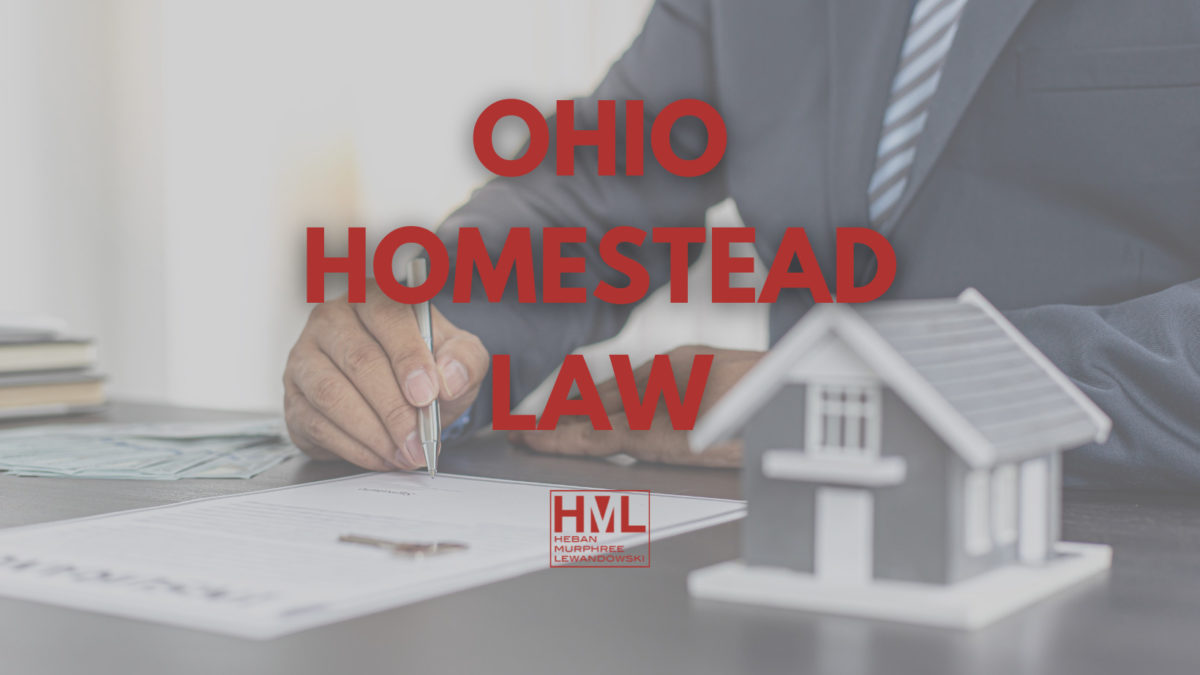- EXPERIENCED LAW FIRM IN TOLEDO, OH
- (419) 662-3100
Ohio Homestead Laws

Ohio Civil Litigation Law – FAQ
April 2, 2023
Understanding the Probate Process: A Step-by-Step Guide for Beneficiaries
May 20, 2023What is Homestead Law?
State homestead laws allow property owners to register a portion of their primary residence as a “homestead,” offering protection from creditors in bankruptcy situations. These protections help prevent homelessness and are based on acreage, equity value, or both. Federal law also provides homestead protections. Homestead protection laws generally prevent the forced sale of a home to pay off creditors, allow surviving spouses to have shelter, and provide exemptions from property taxes on the home. Vacation homes or second houses are not eligible for this exemption.
Who Qualifies for a Homestead in Ohio?
The Ohio Homestead Exemption is composed of two types: (1) Senior and Disabled Persons Homestead Exemption and (2) Disabled Veterans Enhanced Homestead Exemption.
The Senior and Disabled Persons Homestead Exemption shields the first $25,000 of your home’s value from property taxes. For instance, if your home is worth $100,000, you will only be taxed for $75,000.
To qualify, you must meet the following criteria:
- You are at least 65 years old (or will turn 65 the year you apply) or permanently and totally disabled as of January 1st of the year you apply.
- You own and live in the property as your primary residence as of January 1st of the year you apply.
- You have a total gross income (including your spouse, if any) below the limit set by law each year, which is $31,800 for 2017. Visit www.tax.ohio.gov for income limits in future years.
- You are the surviving spouse of a person who was enrolled in Homestead and was at least 59 years old when they passed away.
The Disabled Veterans Enhanced Homestead Exemption, on the other hand, protects the first $50,000 of your home’s value from property taxes. For example, if your home is worth $100,000, you will only be taxed for $50,000.
To qualify for this exemption, you must meet the following requirements:
- You are a veteran of the Armed Forces of the United States (including Reserves and the National Guard) who was discharged or released from active duty under honorable conditions.
- You have received a 100% disability rating for compensation based on individual unemployability for a service-connected disability or a combination of service-connected disabilities.
- You own and live in the property as your primary residence as of January 1st of the year you apply.
For both exemptions, the property must be where you primarily reside, and you must have been living there as of January 1st of the year you apply. Additionally, you must be on the property’s deed, or if the property is held in a trust, you must provide the Auditor with a copy of the trust.
If you’re eligible for the Ohio Homestead Exemption, it’s important to apply to receive the maximum protection allowed under the law. Our experienced attorneys at HML Law can help you determine your eligibility and file the necessary paperwork to ensure you receive the exemption.
Protection From Creditors
Homestead exemption protects homeowners from unsecured creditors in the event of bankruptcy. However, the extent of protection varies from state to state. In some states, such as Florida and Texas, homestead properties have complete protection, while others offer protection ranging from $5,000 to $500,000. It’s important to note that the security is not for the home’s value but for the homeowner’s equity. If the equity exceeds the protection limit, the homeowner cannot be forced to sell the property. However, if the equity exceeds the limit, creditors may force the sale, although the homeowner may be allowed to keep a portion of the proceeds. It’s also important to note that the homestead protection does not apply to secured creditors, such as the bank holding the home’s mortgage.
How To Deduct Homestead Exemption
When it comes to property taxes, a homestead or property tax is usually assessed by the local government tax assessor’s office based on the property’s assessed value. However, depending on local state laws, the homestead tax exemption may provide ongoing reductions in property taxes. This can help surviving spouses stay in their homes even after their income has been reduced due to the death of their partner.
Homestead tax exemptions often offer a fixed discount on taxes, such as exempting the first $50,000 of the assessed value while the remaining value is taxed at the normal rate. For instance, a home worth $150,000 with a $50,000 homestead exemption would be taxed on just $100,000 of assessed value, while a $75,000 home would be taxed on only $25,000.
Using a fixed homestead tax exemption, the property tax becomes more progressive, benefiting those with more modest homes. Sometimes, the exemption is paid for with a local or state sales tax.
How to Apply for Homestead Exemption in Ohio
To apply for both exemptions, you must fill out the DTE105A application form, available at your county Auditor’s office, on their website, or on the Ohio Department of Taxation’s website. You must submit the original form with your ink signature and cannot file it electronically.
If you are eligible based on age, you must provide proof of age, such as a current or expired driver’s license, State of Ohio ID card, birth certificate, or passport. If you are eligible based on disability, you need to provide proof of disability by getting the Auditor’s Certificate of Disability form signed by your doctor or providing a statement from Social Security, the Department of Veterans Affairs, the Railroad Retirement Board, or the Ohio Bureau of Workers Compensation that states that you are totally and permanently disabled.
Suppose you are eligible based on a veteran’s disability. In that case, you need to submit the letter you received from the U.S. Department of Veterans Affairs stating that your application for the status of individual unemployability has been granted (including the percentage assigned), along with a copy of your DD-214.
Expert Legal Guidance
Regarding homestead exemptions, we can help you determine your eligibility and file the necessary paperwork to ensure that you receive the maximum protection allowed under the law. Our team can also guide you through applying for property tax exemptions, including homestead tax exemptions, and help you save money on your property taxes.
In the event of a divorce, our attorneys can provide you with expert guidance on property division and equitable distribution, working to ensure that you receive a fair share of marital property. We can also negotiate on your behalf with your spouse and their attorney to reach a settlement that meets your needs and protects your interests.
Our goal at HML Law is to help you navigate legal matters easily and confidently. We understand that every situation is unique, and we will work with you to develop a personalized strategy that meets your individual needs and goals. Contact us today to schedule a consultation with one of our skilled attorneys.








